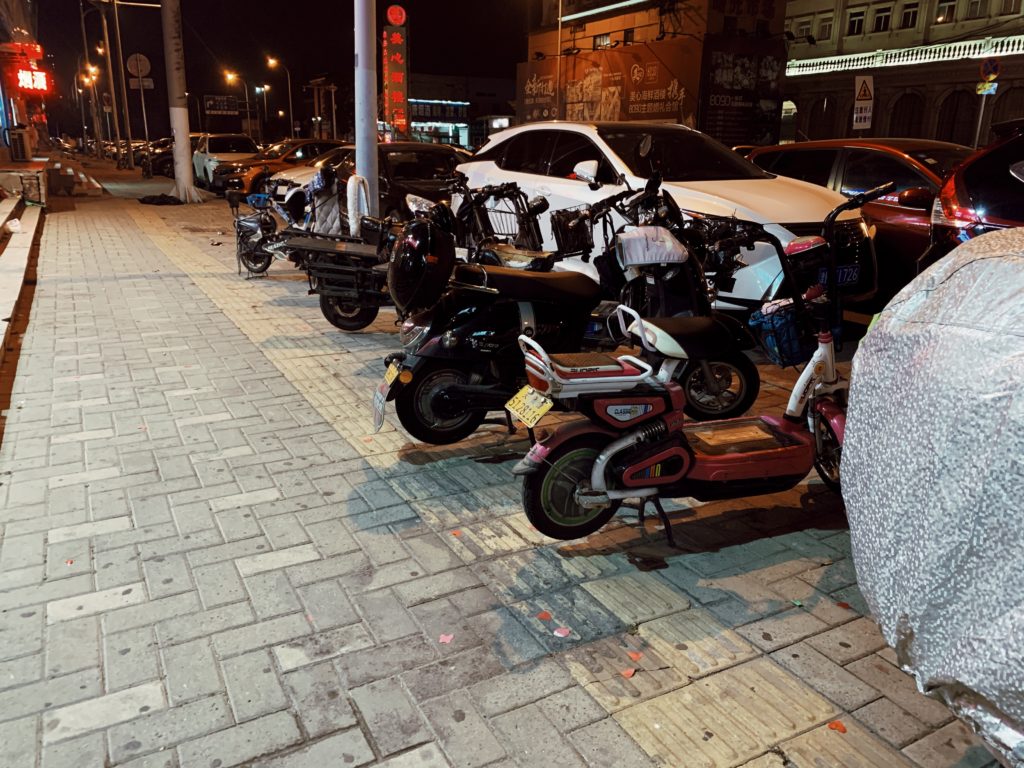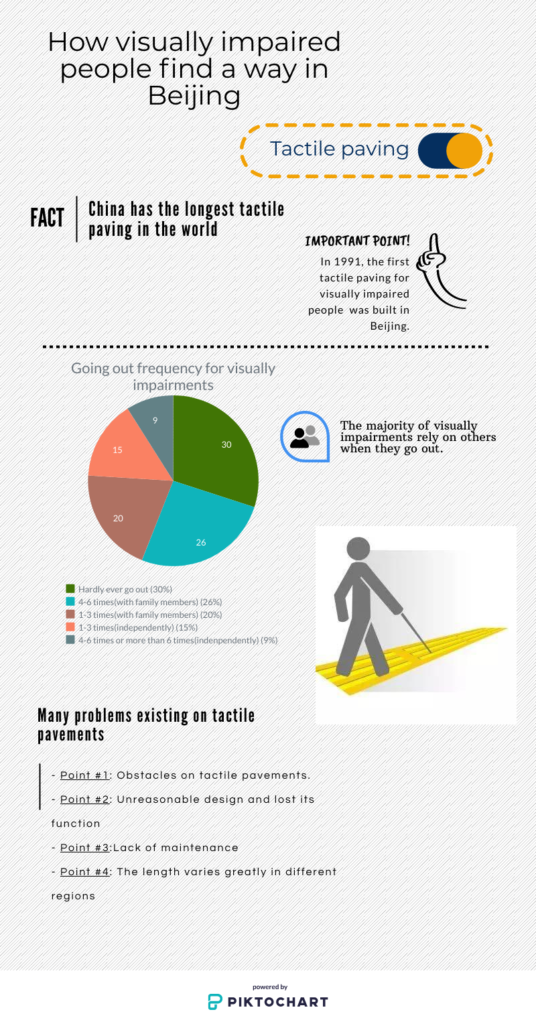People with visual impairments have made huge strides thanks to technology that allows them to operate digital products and access jobs in new areas of the economy, but are infrastructure and social attitudes keeping pace?
A pile of students’ homework are laying on a tidy desk, and a small bed is against the wall. Everything seems ordinary in this crowded room except for a wall covered with different kinds of awards certificates.
However, Rongquan’s efforts and excellence cannot be recognized when he find a job. In 2019, Rongquan, a visually impaired student who graduated from university was rejected for numerous times in workplace, it made him feel that university life was a dream, he need to wake up now.
In 2015, he chose a difficult and different from other visually impaired people’s way to attend the university entrance which is called fate-changing exam in China. Rongquan Zheng as one of the first use of the braille papers to attend the exam, together with 9.42 million ordinary students, he got admitted to the university. On his social media, he introduce himself: Wen Zhou University students, because it is an identity he is proud of. He though, his destiny has changed.
“I ranked the first for both my written test and interview for recruitment,” Rongquan said. He felt excited when he knew that. After graduating from university, he sent a resume to a blind school in Nanjing and hoped to offer a job as politics teacher. He said, “it is not easy for a visually impaired person to study in a university in China, I hope I can do something to give back to my school.” However, due to his vision problem, he received a notice that he will not grant to admit.
It can’t be denied that the speed of internet is high in China, however, there are still many visually impaired people like Rongquan is facing social discrimination and inequality.
For his dream as a teacher and to prove his ability, Rongquan worked as an intern teacher with his classmates to teach in high school in the senior year. Using his residual vision to identify the direction of students so that interact with them; Using a special magnifying device to correct homework word by word. One of his colleagues said, “even though it seems to be laborious, he never delays his students’ feedback, and even more seriously.”
Therefore, when he knows he is rejected, he felt a little angry. He said, “my exam results and past practical experience have proved that I am qualified for the work of the school, why I can’t get an equal opportunity for employment?”
However, he is not alone. The employment discrimination of the disabled has always existed. According to the data of the National Employment and Vocational Training Information Management System of the China Disabled Persons’ Federation, by the end of 2018, the employment rate of the working age people holding the disabled persons’ certificate in China was only 56%. For people without disabilities the employment rate is 72%. However, the stastics is not transparent and up to date and many people are doubt about that. Among them, most of are just open an online store at home or engage in farming, they still need to rely on basic living allowance from the government.
“I’m eager to get equal employment opportunities, and more eager to be treated like an ordinary person.” Through resorting to media, Rongquan entered the blind school and became a political teacher after about four months of efforts and waiting. What still worries him is that the standard of the recruitment has not changes , which means that it will still be difficult for someone like him to apply a job in the future. “I want to do something for other like me, but my own strength is not enough,” he said.
Except for universal existing discrimination for the disabled employment in China, the lack of accessibility facilities is also an obstruction for them to integrate into society. There are nearly 100 million disabled people in China, and the visually impaired account for 17.31 million, about one-fifth of this group. Such a large group is the most rare on the road, and the imperfect infrastructure makes it extremely difficult for them to travel independently.
In China, blind people usually rely on tactile paving. “Many times, when I was walking along that pavement, it disappeared suddenly or something in front of me,” Ke Shen said, who is a visually impaired person. He still remembered, once he was walking, and the end of the tactile paving was a dry well and he almost died.
Tactile paving was originally designed by a Japanese inventor, Seiichi Miyake in 1967 in order to help blind people to travel. It composed of two bulging with grain brick paved. The dotted blocks alert “Attention and danger” and the barred blocks provide a “safe path”. They can be identified with white cane and they can also use the soles of feel. With that help, the blind people can find the direction.

In 1991, Beijing built the first tactile paving in China, which was latter written into the Traffic Safety Law in China. The construction of tactile paving has not really brought much help to the visually impaired. According Di Chen, a social researcher in Beijing, when she did research on tactile paving, she found that due to insufficient publicity, many people did not even know the exist of it. Therefore, the whole lane was often blocked by bicycles and cars. In many areas, people who in charge of the layout of the road are not professional on planning tactile paving. Di said, for the blind people, using tactile pavement in China is even more dangerous. In addition, there is no management and result in a lot of pavings in disrepair and can not play a role.
Ke is blind engineer and he need to go to work independent everyday. As a blind man, he konws that cross the road is a task that is difficult to complete on its own. The warning sound on traffic light is only available in the most prosperous streets of cities, and most of the time he should depends on the help of others. He said, “I don’t want to trouble others, so I have to reduce the times to go out.”
“Golden white cane” training camp is a public welfare activities to help visually impaired people to go out especially for blind students who is going to university. The organizer Cong Cai himself is a visually impaired person, he said, tactile paving in China is not only the problem of being occupied but we need to think about whether it could help more blind people to go out. “It doesn’t means where the tactile paving is built and where the visually impaired people could arrive. It also doesn’t means if there is no tactile paving, they can’t go anywhere,” Cong said, “ In my opinion, tactile pavings were built on such a larger scale but didn’t achieve expected results, is a form of psychological isolation for visually impaired people.”
According to a research in Beijing, only a few visually impairments rely entirely on tactile paving to travel, some of them express that sometimes it is more dangerous when using that.
“But we always believe that methods could always defeat the difficulties,” Cong said. The original intention of his training camp is to let the visually impaired travel independently to give full pay to their abilities. During this process, many trainees’ great feeling is that they dare to go out and face a world they believe is not belongs to them. Cong said, the current situation in China is that people don’t think blind people should travel by themselves, even if the majority of blind people have learnt how to travel with the help of tactile paving and white cane at special-needs school, they won’t be allowed to go to the real environment. What we are doing is encouraging them to go out and change the way society thinks.
Many people said that the lack of accessibility infrastructure is the primary cause for integration into society for the disabled, however, in Cong’s opinion, it is not the key to prevent them to go out, as least for the visually impaired. He said, “more important are people’s attitudes to the disabled group. Views such as coming out are meaningless or bother others make it difficult for them to participate in society.”
In addition, people with disabilities generally have problems with their own identity. Cong used to ask some blind people why they don’t go out, he received answers like “What can I do when I go out? The whole society intentionally or unintentionally excludes us, they don’t welcome us.” Gradually, even the visually impaired people themselves think they shouldn’t go out which leads to they doubt their identity in the society.
Cong said, “I am now on good terms with my disability and only if I can accept my difference, the society can receive me.”
Due to prejudice and outdated concepts, discrimination against disabled people still exists in Chinese society. For example, some companies refuse to accept disabled application without any reason, public places are not allowed to enter. For visually impaired group, news about guide dogs are refused to take public transport are usually reported, there is still a long way to go for disabled people in China.

